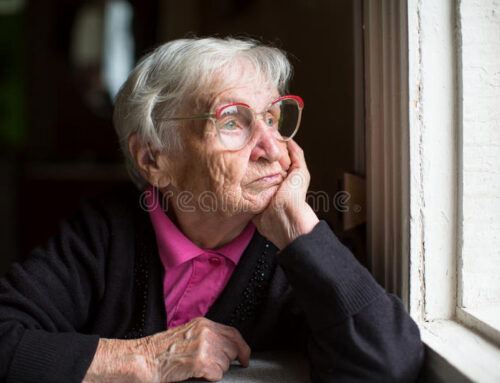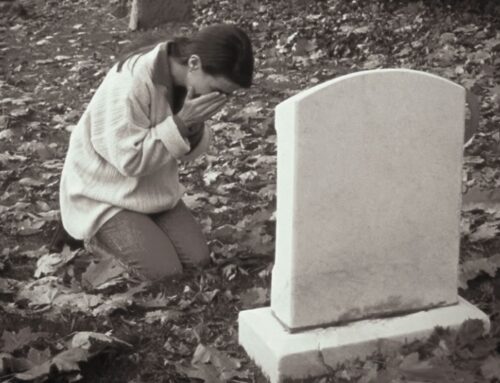Written for opentohope.com
In my years working as a hospice volunteer I have occasionally witnessed a separation between patients and their families, which has resulted in dying “alone,” without a loved one present. It can be a very sad experience to watch. I have a preacher friend who one day said to me that he didn’t know which was harder, dying alone because you have no family, or dying alone because your family stays away, and I had to agree that I didn’t know either. There are two women who stand out in my mind as examples of both situations.
IDA
The first day I walked into Ida’s room all I could see was a slight woman barely visible beneath the weight of her covers. Her bed was close to the floor and there was a pad next to it and no guardrail was up. I can’t imagine this woman falling out of her bed. She was painfully quiet, no words, no expressions, and no movement. Her roommate was screaming and yelling, arms flailing, desperately calling for help. How can a compassionate heart ignore that? The whole scene was just terrible. I went over to the other woman and tried to calm her down for Ida’s sake, and then I went out into the hall to grab someone for help so I could be with my patient.
When all had calmed down, I sat on the bed and held Ida’s hand. There was barely a hint of who she once was; she was so frail, with no reactions, no words, and very little expression. She seemed terribly sad to me, but that might have been just who Ida was, and this was her journey of dying alone. Ida had been a nurse in her lifetime and had never married nor had children. She did have one friend that would drop by occasionally. I did not want Ida to die alone, and thought she might, so I tried diligently to work with the staff at the agency to have vigil volunteers on call.
There is a saying among the hospice community: people die the way they have lived. Ida died alone. For whatever reason, Ida had always taken care of others as a nurse, but no one had ever really taken care of her and this is the way she died, quietly on her own. What I do know with all my heart is that Ida was not alone. The angels were there close by taking care of her.
LORRAINE
Lorraine had lived with her daughter for more than fifteen years. She was tough and strong willed and wanted nothing to do with volunteers or hospice except for a few visits from clinical staff. When her condition worsened after a bout of sickness, her daughter immediately put Lorraine in a skilled nursing facility.
There are some assisted living facilities that I really don’t like. People may be nice, they may do their best, but in some of these places there’s a feeling—an atmosphere—that is really dispiriting. Assisted living or nursing home are the last stop for so many people, and it breaks my heart that we cannot find a way to consistently provide a better experience for the dying.
I could feel Lorraine’s pain and sadness as soon as I walked into her room. I asked her a few questions, and she told me she did not understand why her daughter would not talk to her, or why she couldn’t go home. I didn’t understand either. Lorraine’s daughter had barely visited, and then, without any explanation, she stopped coming all together. This was too tough to watch, but there was nothing I could do; it was neither my family nor was it my journey. I sat in silence as Lorraine wept. When I put my hand on her shoulder to comfort her, she recoiled. “Don’t you feel sorry for me!” She demanded with authority.
My eyes welled with tears. “I don’t feel sorry for you,“ I said. “I have compassion for you because one day I will be old too.” In that instant, I knew that this was exactly what Lorraine needed to hear. Lorraine needed to know that someone cared about her. Ida had died alone but not rejected. Lorraine just gave up one day, stopped eating and left. Just like that. Unfinished business is such a tragedy. Lorraine died alone and feeling rejected.
Who knew what had happened in the history of these ladies’ lives? It was an interesting dynamic, two women dying, one with no family to speak of, the other with a daughter who had abandoned her. The situations I have witnessed in hospice have sometimes blown my mind. I often used to wonder why there was no one who loved Ida, and why Lorraine’s daughter wouldn’t visit her. Withholding love at the end of life is something I just do not understand.
When I speak on the subject of “end-of-life education,” it never fails that someone raises the topics of unfinished business and lack of forgiveness. I always tell my students the stories of Ida and Lorraine, because they need to know that even though the person who’s dying may have done something in their life that you might not agree with, it’s important to remember that it’s their stuff, their learning journey. My advice is to rise above it, work at it, talk to others, friends or a grief counselor, process it, but please try not to let a loved one leave this earth without forgiveness and love. It will help everyone—on this side and the other.
Written for opentohope.com







